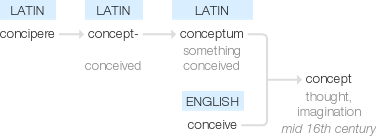Concept
mid 16th century (in the sense ‘thought, imagination’): from Latin conceptum ‘something conceived’, from Latin concept- ‘conceived’, from concipere (see conceive).
wiktionary
Borrowed from Middle French concept, from Latin conceptus(“a thought, purpose, also a conceiving, etc.”), from concipiō(“to take in, conceive”). Doublet of conceit. See conceive.
etymonline
concept (n.)
"a general notion, the immediate object of a thought," 1550s, from Medieval Latin conceptum "draft, abstract," in classical Latin "(a thing) conceived," from concep-, past-participle stem of concipere "to take in and hold; become pregnant," from con-, here perhaps an intensive prefix (see con-), + combining form of capere "to take" (from PIE root *kap- "to grasp"). In some 16c. cases a refashioning of conceit, perhaps to avoid negative connotations that had begun to cling to that word.
